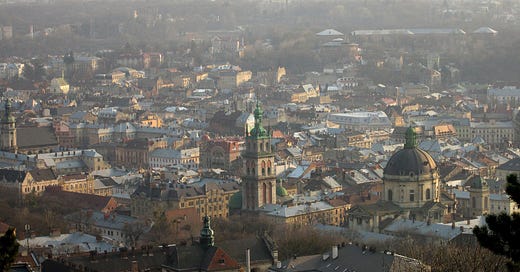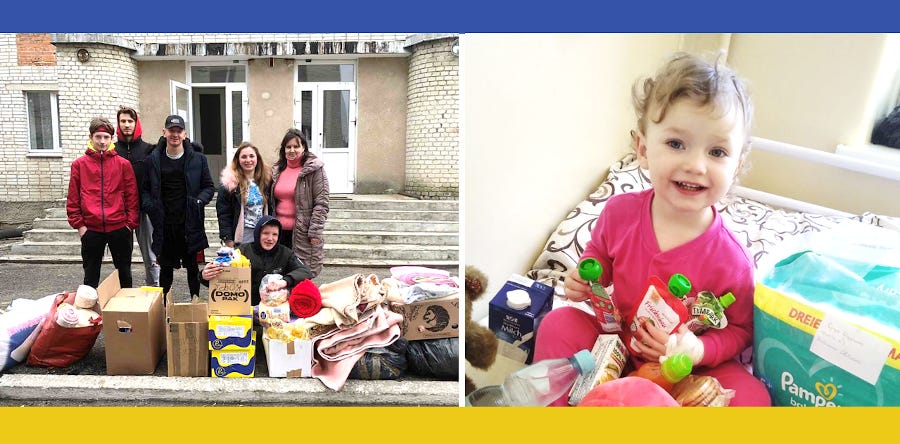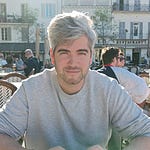Welcome to the 34 new subscribers who have joined since the last edition! If you’re reading this and haven’t subscribed, you can join a high-value community of 1,037 climatetech entrepreneurs, investors, and industry leaders by signing up below.
2-4 times a month I interview extraordinary climatetech entrepreneurs and investors and share insight on how to build your business and find funding. It’s insightful, actionable and fun to read or listen to.
This week I’m venturing away from the usual Green Techpreneur interviews to publish a special Easter edition about a topic close to my heart – Ukraine.
I lived in Ukraine for a number of years as a child and feel compelled to share my experience and shed light on Ukraine’s culture and history. It’s my little way of showing support and solidarity with Ukraine as they combat the horror unleashed by Putin.
…….The rugged, potholed dirt road in front of our house had a large water pipe that would break so often it almost seemed precued to leak, releasing a steady trickle of water that would deepen the rut that ran down the middle of the road.
The dirt road may have been a navigational nightmare for the car driver - bouncing passengers would have to steady themselves by gripping the sides of the vehicle – but to nine year old me, it was a playground.
My parents had moved to Ukraine to build a charity, Care in Action. As foreigners living in L’viv, we stuck out like a sore thumb. Just walking down the street speaking English would elicit stares.
It wasn’t long before our house became a meeting spot for a small group of neighbourhood kids that lived along the dirt road on the outskirts of L’viv.
Our Ukrainian friends would gather by our house in the afternoons - knowing we would be coming out to play. We played Badminton, capture the flag, catch, tag, and football in summer. In winter, we built snow castles and had snowball fights.
The neighbourhood kids were keen to practise their English. I remember when I first met Christina who lived down the street. It was winter and the dirt road was covered in snow. She used a couple of artificial-sounding, memorised English phrases she had learnt in school - “the weather is so chilly.” After a few years of playing together, our friends would take pride in speaking ever-more fluent English.
The girls would ask me to listen to Britney Spears and Backstreet Boys songs and write out the lyrics - so they could learn to sing-along to their favourite pop songs in English. When bell bottoms were all the rage in the West, they made sure they were on trend.
For Christina, there were a few surprises: I remember her shock at once coming to our house and seeing us eat tomatoes in winter - it was something she had never seen before. Like many Ukrainians, Christina grew up eating seasonal food, often grown in a backyard or plot of land, or purchased in an outdoor Ukrainian market. Some food is preserved for the winter in jars.
Christina’s family bred rabbits in a backyard cage. When I asked her the rabbits names, she told me that they were for meat. For many Ukrainians - living in the poorest country of Europe meant that you had to know how to survive.
She had some minor bone deformities because her Dad had been exposed to Chernobyl radiation, and some damage had been passed down through the genes.
Another surprise for Christina was that we had cooked meals - our Ukrainian friends thought Westerners ate mostly fast food. Their point of reference for life in the West was movies and pop culture; for most Ukrainians at the time, leaving Ukraine to visit Europe required a visa that was not easy to get.
They lived in a country that bore the hallmarks of Soviet oppression - an entire system of governance built on corruption. Survival of the ‘haves’ and a small gang at the top at the expense and degradation of the ‘have-nots’. A bribe can get you most places, but without one your hands are tied.
Babuschkas would stand in markets for long hours, selling berries, jam, milk - whatever they could source from their land. In the biting cold of winter, a vodka bottle would help them withstand the cold. Their legs were thick and stubby, their deeply weathered faces shone out from behind their headscarves. I remember a Babuschka breaking down in tears of gratitude and relief when my Dad paid her more than what she asked for. For many Ukrainians, the reality was that winters were bitter and cold and poverty was grinding. Life was hard.
It’s hard to truly describe what oppression feels like. It’s an invisible blanket of misery that hangs in the air. A depression so thick you can feel it in the atmosphere, in the Ukrainian cultural love of the melancholy - an adopted sense of the dignity of suffering. It was like the land itself kept secrets - hidden tales of sorrow and tragedies that run so deep they dare not be revealed. Whispers and sighs that almost came out of Ukrainian fields and forests.
The Ukrainian experience of the Holodomor - the widespread famine that ensued when Stalin stole their wheat - was so harsh and so alive in their memory, that even as a pre-teen, it was something I picked up on.
A bitter memory of absolute cruelty and injustice; when millions of their own starved to death, because of the mechanisms of a bigger, more powerful neighbour next door. But along with that memory lay something else - something remarkable in the Ukrainian national consciousness: an ironclad determination to survive. An almost obstinate inner pride, an unbreakable, patriotic sense of being fiercely bonded in collective resistance, and in needing to defend what was theirs. Ukraine may have been the poorest country in Europe, steeped in problems, oppression and corruption- but it was theirs - their Ukraine. Their story.
I remember exploring deserted railway tracks on the outskirts of L’viv, balancing my way along the tracks; they were overgrown and led mysteriously through forests and meadows. What stories were they hiding? In that vast, fertile land, bordering Europe and Russia - with its birch trees, its crows and its fields, deserted railway tracks lay as remnants of old projects that had started and stopped and gotten nowhere.
Rusting skeletons that spoke of having been trapped between consecutive invading powers that pushed in from both the East and the West. Empires that were built and then crumbled. Only Ukrainians had been left behind, always picking up the pieces.
Now a generation of Ukrainians had grown up entirely outside of the Soviet Union.
I wasn’t in Ukraine during the watershed Orange revolution, but I remember meeting a Ukrainian student, an acquaintance of my parents, who had been studying in Germany. She was passionately, wholeheartedly and zealously involved in supporting the revolution. In Olga, I saw that underlying Ukrainian patriotism and fire come to the fore. A nation that summoned incredible determination from its history of struggle and rose up.
In 2014, once more, tens of thousands of Ukrainians took to the streets in protest as Yanukovych threatened to steer them off the path of Europe and freedom. Many were beaten, some were tortured. But their choice was clear and they would not waver. They had looked across their borders to both the East and the West. They saw a union of comparatively free and prosperous democratic nations to the West and yearned for the same freedom and privilege. To their East they saw Russian neighbours living in dictatorial oppression. When President Yanukovych bowed to intense pressure from Russia to scrap Ukraine’s association agreement with the EU, they chose to fight for their future.
In ensuing years, I heard of a Ukraine that sounded very different from the Ukraine of my childhood. For ambitious, intelligent young Ukrainians, there were remote jobs in foreign technology companies. Travel abroad had become easier, new airlines and cheap flights had brought tourists to L’viv.
They had overthrown the Russian puppet regime and elected their own leader who would work towards the Ukraine they dreamt of. There was something fresh in the air, a bubbling vibrancy - was this what hope felt like? A spring-like feeling that things were getting better after a long dark winter.
I will never forget the feeling of absolute dread I felt the night before the invasion. ‘Russian troops are now 100% in attack position’ - was the last thing I’d read.
And then the shock of waking up to see that the Russian army had launched a full-scale attack on Ukraine.
‘Not Ukraine,’ I thought, ‘my God, not Ukraine.’
I felt absolute devastation.
Horror, anger, agony, rage, heartbreak.
I had lived in Ukraine. I had seen their poverty, their struggle. It was all the more painful to know how incredibly hard their upwards climb had been.
It was like watching someone who you knew had suffered deeply, but who had painstakingly clawed their way up into a better place, being battered and beaten back down just as they had come to see the light at the end of the tunnel.
Memories of Ukraine came flooding back.
Christina, Beata, Olena…childhood friends. What had become of them now?
Were poor, historically oppressed nations destined to remain that way? Is change possible if you fight long and hard enough?
Here I am, in my 30s, engaged in the rollercoaster ride of building a digital magazine. It’s not easy, but the incredible opportunity I have to build my own future and live in a free, democratic country isn’t lost on me.
Meanwhile, my old childhood friends in Ukraine are giving their last breath to defend the right to have a dream: to determine their own future and the future of their children in a free, sovereign country.
Once again, that vast land between East and West is battling imperial tyranny. And the battered bodies, psyches, and homes of a new generation of Ukrainians - once filled with hope - will become a living witness to the brutality of their continued struggle for freedom.
“You crucify freedom, but the soul of man knows no bounds.”
Russian bombs may be falling in Ukraine, but the attacks on the most precious thing we have: freedom, democracy, and social cohesion, are shaking the earth beneath all of our feet.
This Easter, please consider supporting Ukraine in their – and our – fight for freedom:
You can support Ukrainian refugees by donating to my parents’ charity.
In March Care in Action paid for 1,636 beds in hostels to help mothers and children fleeing conflict. Six apartments and a large house allowed 9 families at a time to have a secure place to rest, and 3,500 children and adults received 783 boxes of aid deliveries. Right after Easter, Care in Action will open an its own shelter and care centre for refugees.

In a world increasingly controlled by authoritarian regimes, Ukraine is bucking the growing tide of totalitarian oppression by bravely choosing to defend their right to freedom, democracy, and sovereignty.
In doing so, they are helping protect our democracies from one of the greatest threats today: an expansionist Russia and Russian attempts to destroy European and US democracies by funding disinformation campaigns, far-right political parties, and fuelling nationalism and anti-EU sentiment.
“The European Commission has identified Russian disinformation campaigns as the EU’s greatest threat because they are systematic, well resourced, and perpetrated on a larger scale than similar campaigns by any other country, including China, Iran, and North Korea.
“Even today, Russia is promoting an anti-EU campaign related to the 2020 coronavirus pandemic, designed to spread panic and distrust in European governments.
“Most often, their posts on social media (Twitter, Facebook, Telegram) and other online platforms (YouTube, Google) question the EU’s democratic legitimacy and play up sensitive topics in public debate such as migration, national sovereignty, and values.” – Carnegie Europe.



















Share this post